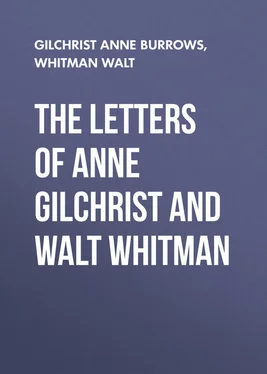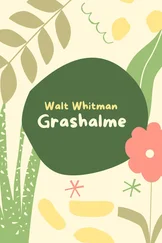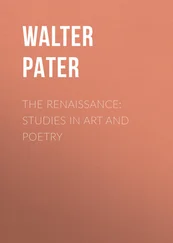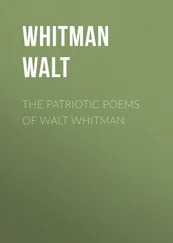Walt Whitman - The Letters of Anne Gilchrist and Walt Whitman
Здесь есть возможность читать онлайн «Walt Whitman - The Letters of Anne Gilchrist and Walt Whitman» — ознакомительный отрывок электронной книги совершенно бесплатно, а после прочтения отрывка купить полную версию. В некоторых случаях можно слушать аудио, скачать через торрент в формате fb2 и присутствует краткое содержание. Жанр: foreign_antique, foreign_prose, на английском языке. Описание произведения, (предисловие) а так же отзывы посетителей доступны на портале библиотеки ЛибКат.
- Название:The Letters of Anne Gilchrist and Walt Whitman
- Автор:
- Жанр:
- Год:неизвестен
- ISBN:нет данных
- Рейтинг книги:3 / 5. Голосов: 1
-
Избранное:Добавить в избранное
- Отзывы:
-
Ваша оценка:
- 60
- 1
- 2
- 3
- 4
- 5
The Letters of Anne Gilchrist and Walt Whitman: краткое содержание, описание и аннотация
Предлагаем к чтению аннотацию, описание, краткое содержание или предисловие (зависит от того, что написал сам автор книги «The Letters of Anne Gilchrist and Walt Whitman»). Если вы не нашли необходимую информацию о книге — напишите в комментариях, мы постараемся отыскать её.
The Letters of Anne Gilchrist and Walt Whitman — читать онлайн ознакомительный отрывок
Ниже представлен текст книги, разбитый по страницам. Система сохранения места последней прочитанной страницы, позволяет с удобством читать онлайн бесплатно книгу «The Letters of Anne Gilchrist and Walt Whitman», без необходимости каждый раз заново искать на чём Вы остановились. Поставьте закладку, и сможете в любой момент перейти на страницу, на которой закончили чтение.
Интервал:
Закладка:
A CONFESSION OF FAITH 2 2 Reprinted from “Anne Gilchrist, Her Life and Writings,” by her son Herbert H. Gilchrist – London, 1887.
“Of genius in the Fine Arts,” wrote Wordsworth, “the only infallible sign is the widening the sphere of human sensibility for the delight, honour, and benefit of human nature. Genius is the introduction of a new element into the intellectual universe, or, if that be not allowed, it is the application of powers to objects on which they had not before been exercised, or the employment of them in such a manner as to produce effects hitherto unknown. What is all this but an advance or conquest made by the soul of the poet? Is it to be supposed that the reader can make progress of this kind like an Indian prince or general stretched on his palanquin and borne by slaves? No; he is invigorated and inspirited by his leader in order that he may exert himself, for he cannot proceed in quiescence, he cannot be carried like a dead weight. Therefore to create taste is to call forth and bestow power.”
A great poet, then, is “a challenge and summons”; and the question first of all is not whether we like or dislike him, but whether we are capable of meeting that challenge, of stepping out of our habitual selves to answer that summons. He works on Nature’s plan: Nature, who teaches nothing but supplies infinite material to learn from; who never preaches but drives home her meanings by the resistless eloquence of effects. Therefore the poet makes greater demands upon his reader than any other man. For it is not a question of swallowing his ideas or admiring his handiwork merely, but of seeing, feeling, enjoying, as he sees, feels, enjoys. “The messages of great poems to each man and woman are,” says Walt Whitman, “come to us on equal terms, only then can you understand us. We are no better than you; what we enclose you enclose, what we enjoy you may enjoy” – no better than you potentially, that is; but if you would understand us the potential must become the actual, the dormant sympathies must awaken and broaden, the dulled perceptions clear themselves and let in undreamed of delights, the wonder-working imagination must respond, the ear attune itself, the languid soul inhale large draughts of love and hope and courage, those “empyreal airs” that vitalize the poet’s world. No wonder the poet is long in finding his audience; no wonder he has to abide the “inexorable tests of Time,” which, if indeed he be great, slowly turns the handful into hundreds, the hundreds into thousands, and at last having done its worst, grudgingly passes him on into the ranks of the Immortals.
Meanwhile let not the handful who believe that such a destiny awaits a man of our time cease to give a reason for the faith that is in them.
So far as the suffrages of his own generation go Walt Whitman may, like Wordsworth, tell of the “love, the admiration, the indifference, the slight, the aversion, and even the contempt” with which his poems have been received; but the love and admiration are from even a smaller number, the aversion, the contempt more vehement, more universal and persistent than Wordsworth ever encountered. For the American is a more daring innovator; he cuts loose from precedent, is a very Columbus who has sailed forth alone on perilous seas to seek new shores, to seek a new world for the soul, a world that shall give scope and elevation and beauty to the changed and changing events, aspirations, conditions of modern life. To new aims, new methods; therefore let not the reader approach these poems as a judge, comparing, testing, measuring by what has gone before, but as a willing learner, an unprejudiced seeker for whatever may delight and nourish and exalt the soul. Neither let him be abashed nor daunted by the weight of adverse opinion, the contempt and denial which have been heaped upon the great American even though it be the contempt and denial of the capable, the cultivated, the recognized authorities; for such is the usual lot of the pioneer in whatever field. In religion it is above all to the earnest and conscientious believer that the Reformer has appeared a blasphemer, and in the world of literature it is equally natural that the most careful student, that the warmest lover of the accepted masterpieces, should be the most hostile to one who forsakes the methods by which, or at any rate, in company with which, those triumphs have been achieved. “But,” said the wise Goethe, “I will listen to any man’s convictions; you may keep your doubts, your negations to yourself, I have plenty of my own.” For heartfelt convictions are rare things. Therefore I make bold to indicate the scope and source of power in Walt Whitman’s writings, starting from no wider ground than their effect upon an individual mind. It is not criticism I have to offer; least of all any discussion of the question of form or formlessness in these poems, deeply convinced as I am that when great meanings and great emotions are expressed with corresponding power, literature has done its best, call it what you please. But my aim is rather to suggest such trains of thought, such experience of life as having served to put me en rapport with this poet may haply find here and there a reader who is thereby helped to the same end. Hence I quote just as freely from the prose (especially from “Democratic Vistas” and the preface to the first issue of “Leaves of Grass,” 1855) as from his poems, and more freely, perhaps, from those parts that have proved a stumbling-block than from those whose conspicuous beauty assures them acceptance.
Fifteen years ago, with feelings partly of indifference, partly of antagonism – for I had heard none but ill words of them – I first opened Walt Whitman’s poems. But as I read I became conscious of receiving the most powerful influence that had ever come to me from any source. What was the spell? It was that in them humanity has, in a new sense, found itself; for the first time has dared to accept itself without disparagement, without reservation. For the first time an unrestricted faith in all that is and in the issues of all that happens has burst forth triumphantly into song.
“… The rapture of the hallelujah sent
From all that breathes and is …”
rings through these poems. They carry up into the region of Imagination and Passion those vaster and more profound conceptions of the universe and of man reached by centuries of that indomitably patient organized search for knowledge, that “skilful cross-questioning of things” called science.
“O truth of the earth I am determined to press my way toward you.
Sound your voice! I scale the mountains, I dive in the sea after you,”
cried science; and the earth and the sky have answered, and continue inexhaustibly to answer her appeal. And now at last the day dawns which Wordsworth prophesied of: “The man of science,” he wrote, “seeks truth as a remote and unknown benefactor; he cherishes and loves it in his solitude. The Poet, singing a song in which all human beings join with him, rejoices in the presence of truth as our visible friend and hourly companion. Poetry is the breath and finer spirit of all knowledge; it is the impassioned expression which is in the countenance of all science, it is the first and last of all knowledge; it is immortal as the heart of man. If the labours of men of science should ever create any material revolution, direct or indirect, in our condition, and in the impressions which we habitually receive, the Poet will then sleep no more than at present; he will be ready to follow the steps of the man of science not only in those general indirect effects, but he will be at his side carrying sensation into the midst of the objects of science itself. If the time should ever come when what is now called science, thus familiarized to man, shall be ready to put on, as it were, a form of flesh and blood, the Poet will lend his divine spirit to aid the transfiguration, and will welcome the being thus produced as a dear and genuine inmate of the household of man.” That time approaches: a new heaven and a new earth await us when the knowledge grasped by science is realized, conceived as a whole, related to the world within us by the shaping spirit of imagination. Not in vain, already, for this Poet have they pierced the darkness of the past, and read here and there a word of the earth’s history before human eyes beheld it; each word of infinite significance, because involving in it secrets of the whole. A new anthem of the slow, vast, mystic dawn of life he sings in the name of humanity.
Читать дальшеИнтервал:
Закладка:
Похожие книги на «The Letters of Anne Gilchrist and Walt Whitman»
Представляем Вашему вниманию похожие книги на «The Letters of Anne Gilchrist and Walt Whitman» списком для выбора. Мы отобрали схожую по названию и смыслу литературу в надежде предоставить читателям больше вариантов отыскать новые, интересные, ещё непрочитанные произведения.
Обсуждение, отзывы о книге «The Letters of Anne Gilchrist and Walt Whitman» и просто собственные мнения читателей. Оставьте ваши комментарии, напишите, что Вы думаете о произведении, его смысле или главных героях. Укажите что конкретно понравилось, а что нет, и почему Вы так считаете.












